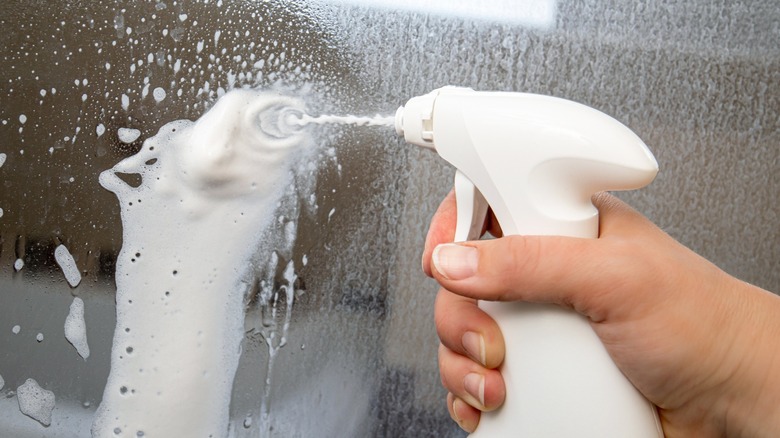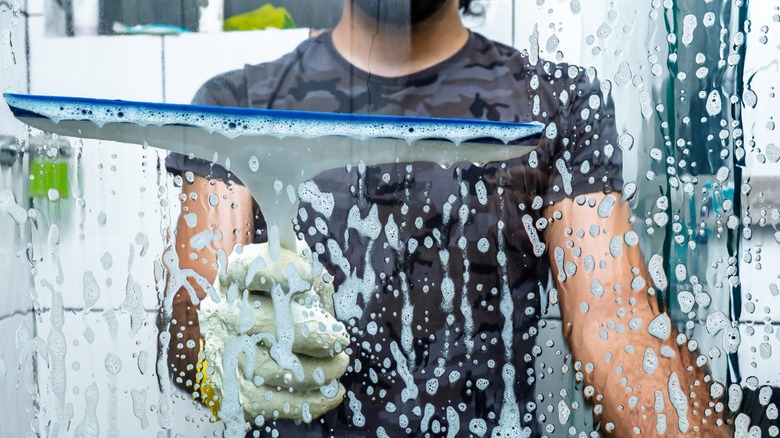Keep Glass Shower Doors Clean & Streak-Free For Longer With One Simple Addition
Glass shower doors are one of those design features that can instantly elevate your bathroom space. When they're sparkling clean, they open up the space, making it feel bigger and brighter. However, keeping the glass clean is not as easy as most people think. That's because water, soap, and mineral stains build up fast. And once they do, it becomes harder to get your shower door back to how it looked when you first had it installed. That may lead you to explore new cleaning hacks, but the solution could be as simple as adding a thin layer of protective coating to your shower doors.
At some point, you may have even wondered what other people — hotels, for instance — do that you're not doing to keep theirs looking spotless. Regular cleaning isn't enough to keep your shower doors truly clear, and you might be using the wrong cleaning products. Windex, for example, isn't the best for cleaning shower doors. It's not strong enough to cut through hard-water stains or break down soap residue. Even if the door looks clear right after cleaning, it doesn't stay that way for long. As soon as you take your next shower, you may start to notice those annoying white streaks form as the water dries.
So the fix isn't scrubbing a lot more frequently or using stronger products. Most times, all you need to do is add a protective coating that works like a screen protector for your shower door. Ceramic coating sprays that you do yourself are popular and easy to apply. Exploring what these products are and how they work can help you learn how to choose the best option for your bathroom.
What are shower glass coatings, and how do they work?
Protective coatings are ultra-thin treatments that bond to the outermost layer of your shower glass. Many are only a few molecules thick, so they're completely invisible to the eye, but you'll notice a difference in how water, soap, and residue behave when they hit the coated glass. The coating essentially makes water bead up and roll off, rather than spread out and stick, so there's less staining and buildup. That way, your shower glass stays cleaner for longer.
Some shower panels come with this protective layer already fused into the glass at the factory. Others are wipe-on or spray-on treatments made with silica-based formulas or ceramic shower sprays that you apply yourself. They typically form a hydrophobic layer — which just means they repel water by creating a surface that's harder for fluids to cling to.
Overall, it's an efficient way to protect your shower glass, especially if you've been scrubbing hard with little to no difference. In that case, you could be dealing with something called glass cancer, which means all the buildup has caused etching and corrosion on the glass. And at that point, it's probably time to stop cleaning and just replace the shower glass. When you do, consider getting a glass that comes with a factory-applied coating. They cost more upfront, but they're built to last for years with little maintenance and are often backed by lifetime warranty support. The DIY ceramic coatings, on the other hand, are cheaper and easy to apply, but they don't last nearly as long. You'll need to reapply them every few months to keep the glass protected.
What are the different types of shower glass coatings?
The right coating depends on your space, how you use it, and what you're trying to prevent. Some people just want to stop water spots. Others are dealing with hard water, constant fog, or filmy residue from body products. That's why manufacturers have designed different categories of coating to target specific concerns.
Hydrophobic coatings are the most common — and for good reason. They prevent soap scum and hard water build-up in your shower. Oleophobic coatings go a step further. They're less common, but they're designed to hold up against oils and greasy substances. So, if you use body oils, creamy cleansers, or hair products that tend to leave the glass looking pretty messy after, this kind of coating can help. For homes with hard water, anti-limescale coatings are specifically formulated to block limescale and mineral residue.
And if your bathroom stays fogged up after every shower, there are anti-fog coatings designed to stop condensation from clinging to the surface. There are even anti-microbial coatings that help prevent mold and bacteria from taking hold. If your shower glass is constantly exposed to natural light — let's say it's an outdoor shower or your bathroom has a large window — consider choosing a coating with UV resistance. Finally, regardless of the type of coating, if you're going the DIY route, make sure the glass is squeaky clean and totally dry before applying it. If there's any moisture or grime left, the coating won't stick well or last as long.


